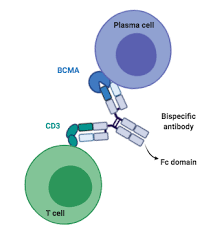 Bispecific monoclonal antibody
Bispecific monoclonal antibody
A bispecific monoclonal antibody is an artificial protein that can simultaneously bind to two different types of antigen or two different epitopes on the same antigen.
Bispecific antibodies aim to enhance the power of the immune system.
Bispecific antibodies target two epitopes: one is the cancer cell and the other resides on a T cell.
Bispecific T cell engagers.
Bifunctional, antibodies are antibodies molecules in which one arm targets a tumor antigen and the other arm targets, a T cell surface molecule, such as CD3.
The bispecific antibody activates the T cell, bringing into close proximity to the cancer cell.
The majority are IgG based antibodies.
The T cell then kills the cancer cell.
They are off the shelf treatments.
Naturally occurring antibodies typically only target one antigen.
BsAbs can be designed to recruit and activate immune cells, to interfere with receptor signaling and inactivate signaling ligands, and to force association of protein complexes.
There are three types of bispecific antibodies: trifunctional antibody, chemically linked Fab and bi-specific T-cell engager.
The two main formats are IgG-like and non-IgG-like.
IgG-like has the traditional monoclonal antibody (mAb) structure of two Fab arms and one Fc region.
The two Fab sites bind different antigens.
IGg-like types are called trifunctional antibodies, as they have three unique binding sites on the antibody: the two Fab regions, and the Fc region.
Each heavy and light chain pair is from a unique mAb.
The Fc region made from the two heavy chains forms the third binding site.
These BsAbs are often manufactured with the hybridoma, method.
In cancer immunotherapy,
BsAbs are engineered to simultaneously bind a cytotoxic/target cell to be destroyed.
Catumaxomab, one of the first trifunctional antibodies approved for therapeutic use, binds both CD3 on cytotoxic T cells and EpCAM on human adenocarcinoma cells, and the Fc region additionally binds to a cell that expresses Fc receptors, like a macrophage, natural killer cell or dendritic cell.
This allows for the BsAb to trigger common immune responses when recognized by an Fc receptor, such as antibody-dependent cell-mediated cytotoxicity or complement-dependent cytotoxicity.
To improve the therapeutic efficacy, simultaneously interfering/blocking of two signaling pathways, reduces the possibility of the escape mechanisms adopted by the tumor cells.
BsAbs can block the interaction between some viruses and endosomal proteins prevents viral escape from the endosome and further infection.
Cancer immunotherapy with ordinary monoclonal antibodies does not activate T-lymphocytes because the Fab regions are already used for binding the tumor cells, and this type of cell does not have Fc receptors.
Bispecific antibodies also have a higher cytotoxic potential, and bind to antigens that are expressed relatively weakly.
Non-IgG-like BsAbs, their smaller size allows them to reach antigens usually unavailable to conventional monoclonal antibodies.
Targeting more than one molecule can be useful to circumvent the regulation of pathways and avoid resistance to the treatment.
The binding or blocking multiple targets in a pathway can be beneficial to altering disease.
BsAbs are being used to treat certain types of cancers, as, over time, as some tumors develop resistances to checkpoint inhibitors and/or co-stimulatory molecules.
IgG-like antibodies can be immunogenic: the Fc region could cause detrimental downstream immune responses caused by cells that are activated by Fc receptors.
Bispecific antibodies have a wide variety of applications in diagnosis and therapy.
BsAbs can be combined with HRPO, can be used in pre-targeting strategies, and can be used to provide better imaging for early detection in diagnosis.
BsAbs target immune cells, help and activate immune cells, fine-tune the function of immune cells, improve the tolerance of immune cells, and promote the return to immune homeostasis.
BsAbs are applied to treat other diseases, including hemophilia A, diabetes, Alzeimer’s disease, and ophthalmological diseases.
Bispecific antibodies: Blinatumomab, which targets CD19 and CD3, is used in the treatment of Philadelphia chromosome negative B cell acute lymphoblastic leukemia (ALL).
Bifunctional antibodies that target CD3 T cells are used in the treatment of hematologic cancers, including: leukemia, lymphoma, and myeloma.
Myeloma targeted by functional antibodies target CD3 on T cells, and either B cell maturation antigen (BCMA) or a G protein coupled receptor GPRC5D.
Emicizumab, which targets clotting factors IXa and X, is used in the treatment of hemophilia A.
Amivantamab, targets epidermal growth factor (EGF) and MET receptors, for adult patients with locally advanced or metastatic non-small cell lung cancer (NSCLC) with epidermal growth factor receptor (EGFR) exon 20 insertion mutations.
The side effects of bispecific antibodies are relatively specific to this class of drugs. In general,
These agents have a similar toxicity profile that is usually based on their ability to incite cytokine release syndrome.
The side effects seen with bispecific antibodies are similar to those reported with CAR T-cell therapy, they occur at much lower rates and with lower severity.
Bispecific antibodies are typically administered in a continuous manner: once a week, once every other week, and once a month.
Most of the toxicities occur within the first few weeks of treatment, and after the first few weeks, the toxicity profile dramatically improves.
Bispecific antibodies provide an off-the-shelf option, so they can be used immediately.
Bispecific antibodies, which bind to both CD 20 on the tumor cell and CD3 in the patient’s T cells, have directly facilitated cell mediated toxicity in B cell lymphomas.
Bispecific antibodies approved for third line or later treatment of relapsed/ refractory, large B cell lymphoma include: glofitamab and epcoritamib.
Blinatumumab is a by specific T cell engager approved for the treatment of patients with leukemia.
Mosunetuzumab is a bispecific antibody with the efficacy in the majority of patients with follicular lymphoma.
Teclistamab, elranatamab talquetamab for my specific antibodies to be CMA and used for multiple myeloma.
